For Six Square Executive Director Pamela Benson Owens, activism is a constantly evolving fight for liberation.
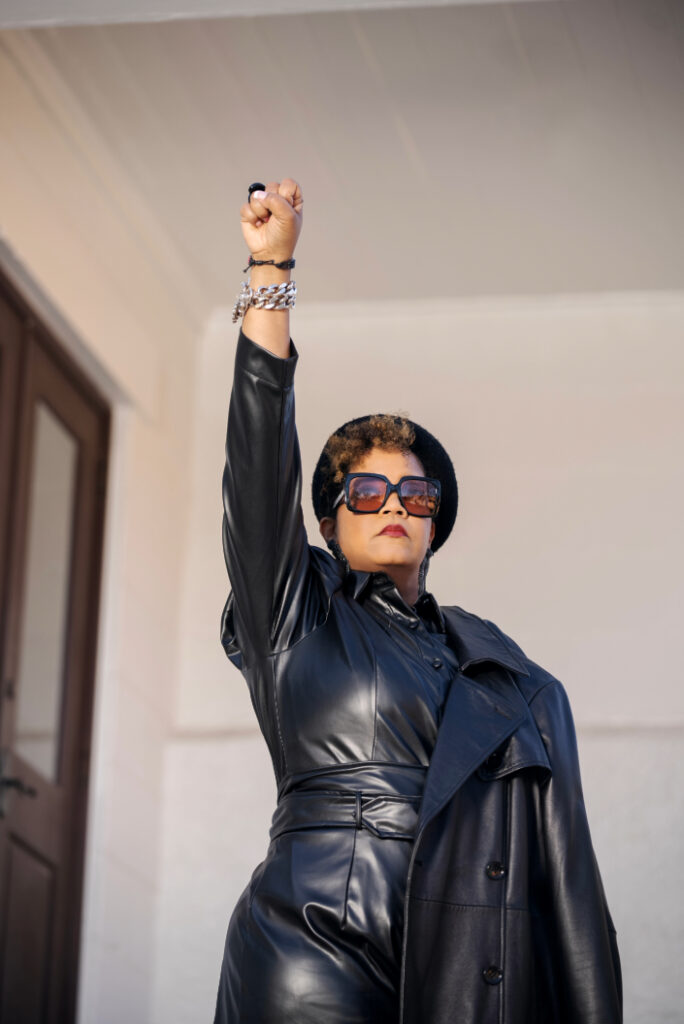
Faux leather top and pants, bracelets and sunglasses; shoes: PBO closet
Leather jacket: Empress Style Closet
Earrings: Garden Room Boutique
By Cy White. Photos by Romina Olson. Styling by Empress Bey (with inspiration from Garden Room Boutique and Estilo Boutique) Shot on location at Huston-Tillotson University. Special thanks to Ebony Kilgore.
There are days when the rainbow isn’t enough. When holding on to the hope of better becomes a bittersweet fight between your heart and your mind. Imagine standing on the precipice for years, hoping that this time won’t be the time when your legs give beneath you. For women like Six Square’s Executive Director Pamela Benson Owens, who are compelled to a life of service, activism must be so much more than the ability to stand on the front line and fight.
For this reason, the first question is, “How are you?”
Sometimes you gotta let people know how to treat you.
Owens, a woman who has given so much of her emotional, physical and spiritual energy to the calling, speaks with brightness in her voice about her latest life milestone, one that has brought fresh perspective and a new journey.
“I turned 50 in October of last year,” she begins. “I started going into that with a little bit of dread. Like, ‘Oh my gosh, I’m going to be 50.’ It was almost like a time warp. I will say within a few short weeks, I got really comfortable and excited with 50.
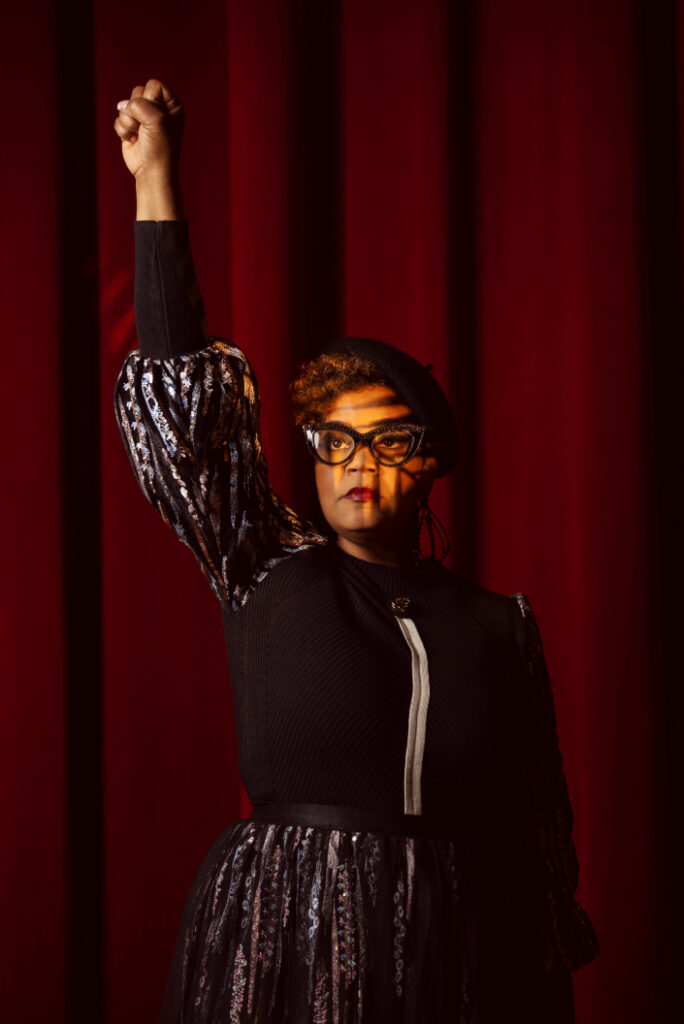
“Fifty brings about the opportunity to speak shorter sentences about my decisions or choices,” she muses. “Now I’m almost 50 reckless.” A laugh that could only come from someone who’s had decades of having to overexplain herself and the realization that a lack of comprehension is more you than a dearth of information. This new lease on life comes with new confidence. It’s the confidence to speak with steel in your voice to those who you respect as elders. Activism is about boundaries.
“There used to be this kind of reserved piece around secrets, not saying all the things and let’s just have a nice dinner,” Owens recalls. “[There’s] the generational trauma that comes with not saying it. Now, I am just not going to subscribe to that. I am fully committed to cycle-breaking in my own family and my own generational peace. It’s messy—I call it the messy middle—and I’m fine with that. I have kids who I brought into the world, and I’m building a world for them that I know I’m not going to be in. So now it’s like, ‘Oh, I’m so sorry, Uncle So-and-so. Don’t ever make a homophobic comment in my presence with my kids around. Ever. You just got gut checked, oh, ye elder.’ [Turning] 50 was like a permission slip.”
Survival mode is not sustainable. Stop using self-care as an emergency tactic.
As with many Gen X and Millennial activists, Owens came from an era where the notion of rest was thought of almost in the pejorative. It’s often positioned as a sign of weakness or lack of commitment to the cause. However, at some point, the body will snatch the choice away from you. Owens embraces rest as an act of absolute protest.
“Rest as a right,” she says. “Comfort as something I have access to. By creating that space for other women specifically, I’m saying to women more, ‘Why don’t you not do that today? Why don’t you sit your ass down? Why don’t you take a break?’ That has been a real joy to go into that space unapologetically. This whole thing about being busy, it’s not effective. Black women specifically hold all of the pieces. We become good at it; we’re conditioned. Not every problem is ours to solve.; not every person is a project to take on. Not every argument we need to go to and fight. That’s the level of resistance I’m leaning in to.”
This dedication to rest as resistance is part of what inspired the methodology to personal and professional development at Edge of Your Seat Consulting, Owens’ consulting firm of more than a decade. She conceived of the “Percolate Method” after her body forced her to take a seat.
“I had a series of getting ill,” she says. “I was heading to do a speech, and I tore my ACL. Got back from that [and found out]that I had thyroid cancer. Then after that, just a series of things. I realized that I was addicted to two things: perfectionism and grind culture. I wore busy as a badge of honor.” A small bit of sadness creeps into her voice, her face momentarily clouded over with realization. “People ask me what I’m doing. I’m like, ‘I’ve done 75 things today.’ My body kind of being like, ‘We’re gonna ground you,’ was a wake-up call.
“‘Busy’ is a zero-sum game. Over-functioning is not effective. When I got to the other side of that, I had to admit to myself that my work was only landing as well as it was because I’ve been doing it a while, not because I took the time to really do quality work.”
There are few things capable of shaking someone so much they change their entire approach to life like the body breaking down. Living for the cause is an exhausting existence, one that hangs heavily on the body like a lead blanket. With Owens’ natural inclination to learn and grow, she started her own deep dive into the nervous system, how it reacts and responds to stress and trauma. This while learning that due to illness, her body no longer produces cortisol or serotonin. “It’s all synthetic,” she reveals. “A series of health crises [let me know]I’ve got to do something different; I don’t want to perpetuate that the only way to make an impact in the world is to wear yourself out.
“I started percolating around that time and started putting on my calendar 20 minute slots to stare at the wall to just bring myself down. To practice not doing anything. I went to a recovery group to get over perfectionism. Spent a year just saying no. I have actively gone after it, being able to look myself in the mirror at night and like what I see, meaning I didn’t sell my soul to do it.”
Know where the love is.
This new perspective aligns so fiercely with Owens’ work as an activist. As someone who grew up surrounded by the literature and imagery of activism in her household, Owens recalls how natural it was for her to pour herself into a life of service to the community.
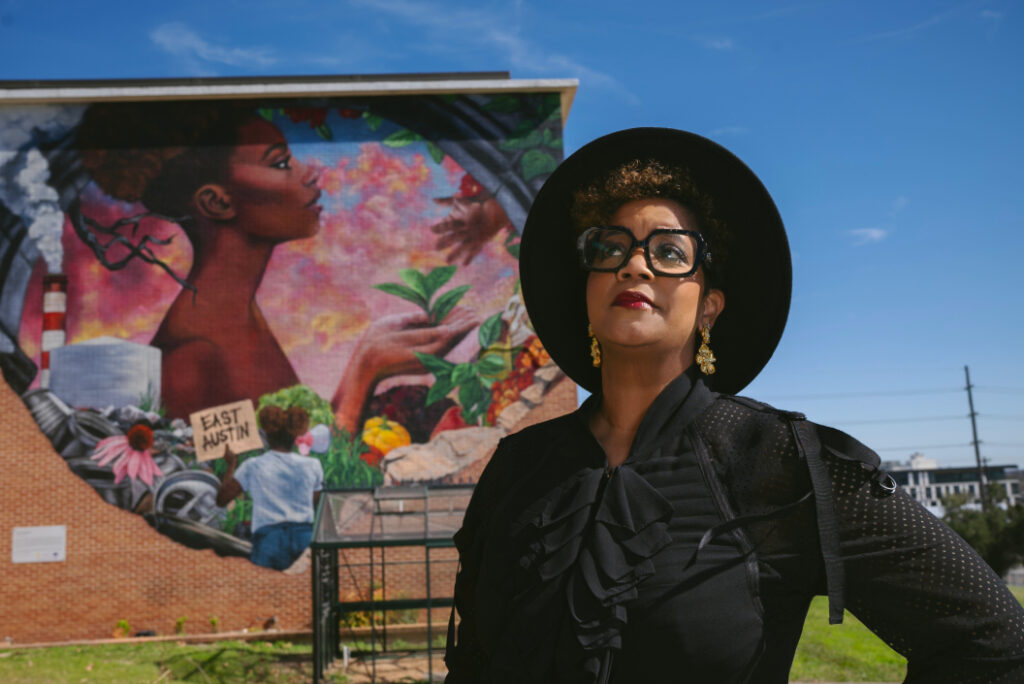
Black ruffle top and black pants: Garden Room Boutique
Fedora: Estilo Boutique
Gold earrings: Garden Room Boutique
“My parents absolutely were civic-minded people,” she says. “I love that they were before their time. Volunteerism happened very early in our home; being in the community and understanding who we were came very early in the home. Both parents, but especially my father, spent as much time on nonprofit boards at the Urban League as he did doing his day job. I didn’t even know that you had an option not to do that. Watched my father’s letter-writing campaigns and him working on changing legislation.
“I have a picture of me holding a sign,” Owens says quickly, latching on to the fervor of the moment. “[The sign] says, ‘Mark White out.’ Mr. White was running for governor, and my mom was like, ‘This fool cannot possibly run our state. He doesn’t understand education.’ She explained on the way there what’s happening. I was at the Capitol picketing with the teachers. I don’t know if I conceptually totally understood, but what I did understand was the look on my mother’s face. That face will always be in my head because it was this face of, ‘We are not going to tolerate this inequity, poor treatment and the way teachers are not valued.’ I clearly got that message. I might have been 8 or 9. That told me I had a responsibility as a citizen to not be passive in my existence, in our community.
“Both of my parents were very active, kind of self-made activists. When my mom used to pick me up every day, it was never, ‘How was your day?’ It was always, ‘What questions did you ask in class today?’ It trained me to get curious in the classroom and ask the questions, and not settle for an answer that didn’t click. I have passed that on to both of my kids.” She pauses, recognizing a twin spirit in her own oldest daughter. “My oldest ends up in trouble a lot because of her style of questioning.” The laugh Owens lets loose is endearing, spiced with motherly pride. “But her intention is, ‘You didn’t tell the whole story.’ I really respect my mom and my dad for demanding that critical thinking be almost more important than the basics of reading, writing math.
“I’m not sure if I woke up and was like, ‘I am about to do this peace and justice thing,’” she muses. “I think in every career stop, my posture was about how to create a space for clarity, how to create a space for learning to occur, how to create a space for somebody to trust themselves and their own skill. How to create a space for somebody to be strong enough to get rid of their inner critic. I think it was all activism to a certain point, removing an obstacle, creating a space for somebody to come into their own, whatever rendition that is.“
Growth often isn’t loud, nor does it need to be announced.
This affection for the building blocks of her call to action crosses over into something akin to awe at the realizations she’s gleaned from her lifetime of being a voice for those whose voices have been stolen from them. The act of listening is an act of rebellion. Sitting in silence to better appreciate the sound of a whisper is activism in its purest form. Listening activates the parts searching for a solution. Listening to understand the full scope of a situation allows one to really lean into finding the right course of action and executing it with intention and grace.
“There is a place for kicking ass,” she says. “I just don’t always think it’s the first lever to pull. Sometimes you have to burn the shit down so you don’t walk back over the dysfunction of it, but that’s not the first lever I pull. My levers are: What am I observing? What is the story I’m telling myself about what I’m observing? Do I have the courage to say that I was speaking from a less-informed place when I made that call? What is my role in either accelerating or stalling where we’re trying to go? Then if I get through all of that and the Choose Your Own Adventure book says, ‘Burn the shit to the ground…’”
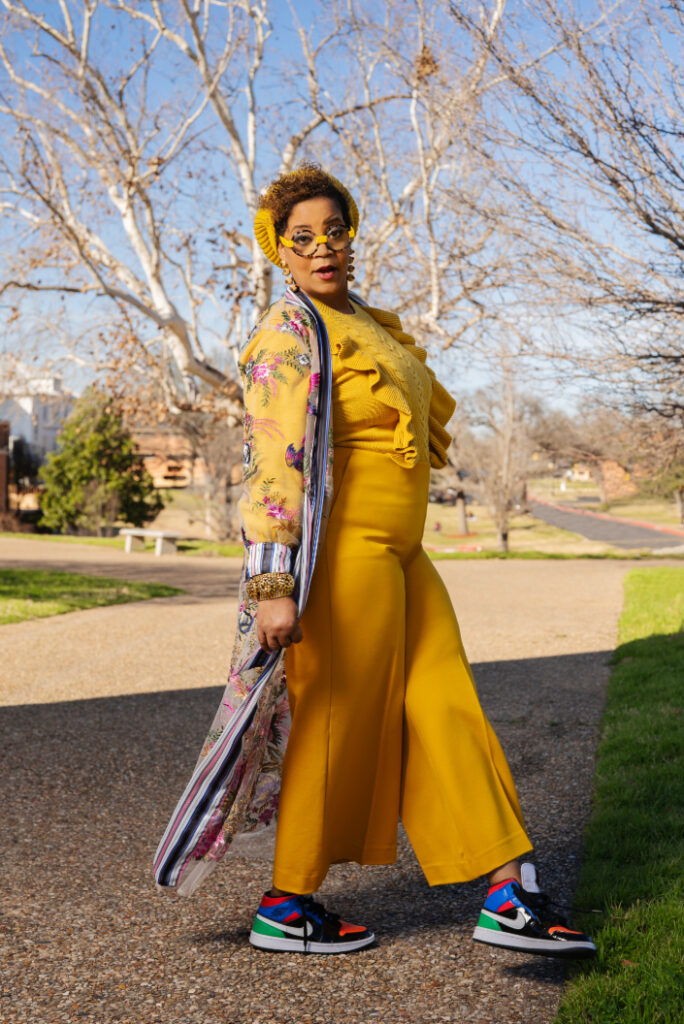
Pamela Benson Owens is an accomplished author, penning such books as her most recent release, The Lesson of Lists, in which she’s created lists to help people on their own paths of self-reflection and healing. “I got that from my dad,” she says. “It’s now become a tool for me to check in, to make sure I’m okay. It simply means that there is a difference in happiness and contentment. I gave up happiness a long time ago, because happiness is fleeting and temporary. I want to be content in all these areas of my life. Meaning it can be burning to the ground, but my peace is not thwarted. The lists helped me to check in and get rid of what I need to get rid of so I can move forward without the baggage of life.”
A list for Black and Brown women when the rainbow isn’t enough.
Get brave enough to look at the reality of your life and face it.
Get in the business of healing so you don’t bleed on other people.
Growth often isn’t loud, nor does it need to be announced.
Take time to reprogram your soul when you need to.
Know where the love is.
You can’t always play nice. Sometimes you gotta let people know how to treat you.
Don’t live in the house that fear built.
Survival mode is not sustainable.
Don’t let people be culture vultures.
Hold your ground; wear your hair [how you want]; dress like you want; do your thing.
Stop using self-care as an emergency tactic. It should be a daily practice. Don’t use it like triage.
Stop issuing conditional forgiveness. It’s holding us back. It’s impacting our ability to see each other.
Make sure the same people who are in the trenches with you clap with you too.
The shrug isn’t one of apathy. Owens has seen so much in her journey to healing herself and the wounds of a shared societal past that this shrug reads like someone who’s gone through every option more than once only to find herself at a point of no return. “I’ve run into that,” she admits. “But I have to be willing to look at the ashes once I do, to take ownership of the ashes. A lot of people have burned [everything]to the ground and stepped over it, not taking ownership of ashes. I’m fine with burning shit down, but you’ve got to scoop those ashes up and say, ‘Now where do we go from here?’”
It’s her openness to incorporate lessons gleaned from older and younger generations that’s so fascinating. There are tenants of activism that are stalwart, chief among them intentionally lending your service to those in need. However, her willingness to break down the crumbling structures of 1960s-era activism creates a sturdier foundation for future leaders.
“I absolutely believe activism evolves,” Owens says. “To me, part of the learning opportunity that I’m really vocalizing more is how acceptable it is to say, ‘I now have more information, and my perspective has adjusted.’ Sometimes we get clouded by the cause. Meaning, I’m so far out in the lake on it, I’ve committed so much to this, that even if I get new information, I can’t change. I think that’s harming us. Sometimes it should be, ‘I am fully committed to this cause, and I have now gotten more information and lived experience. I feel differently about some of the pieces of the work, and I have a right to change my mind.’”
Evolution can be another word for deconstruction. Something has to fall away, to destruct, in order to make way for something new that will take the movement to its next level. Evolution means inevitably something has to pass on in order for us to move on.
“I don’t think we postmortem ourselves enough,” Owens reflects. “We do it at events, but do we sit at the end of every day and go, ‘Was it a bad day, or was it a bad moment? Did I show up the best I could to speak on behalf of my people? Then what did I learn from that?’ I always tell people two things: a) whatever I think it is, that’s usually not it, and b) once you have the audacity or the arrogance to call yourself an expert, you’ve lost the activism fight.
“Activism is about the ongoing willingness to learn, grow, evolve and then implement what you’ve learned. If you stop learning, we’ve lost the fight. The minute you think you’ve conquered it, there’s an arrogance and ego that is counterproductive to the movement. When you decide that being right is more important than doing what is most effective and best for the community, we’re losing.”
Owens carries in her gaze a wisdom wrought from years of having to navigate her calling. Behind those bespeckled black-framed glasses, she has an intellect that leaves anyone motivated to conquer the world’s problems after a single meeting with her.
“To me, the two most critical leadership attributes, activist attributes, community citizen attributes: self-awareness and courage,” she says. “Can’t buy it. That is intrinsic. Giving people the space and the permission to do the deep-tissue work on self-awareness is half of it. It allows people who are not impacted by something to say, ‘Just because it’s not my experience doesn’t mean it’s not a valid experience.’”
Make sure the same people who are in the trenches with you clap with you too.
It comes as no surprise that a large part of Owens’ activism involves education. After all, Six Square is the first Black cultural district in the state of Texas and the only cultural arts district in the city of Austin. The nonprofit’s sole purpose is to preserve the history of East Austin, that six square miles of pittance flung at Black and Brown families to move them out of Austin’s center in 1928. It’s work that continues to remain as (unfortunately) relevant and necessary as it was in its earliest days in 2013.
Education is as much a part of her role as executive director of Six Square as her own endeavor, Edge of Your Seat Consulting, a firm that unpacks the intricacies of evolving as a professional as well as an individual navigating complex sociopolitical conversations. Even her path to this point was deeply rooted in an evolution of thought surrounding how to help professionals develop.
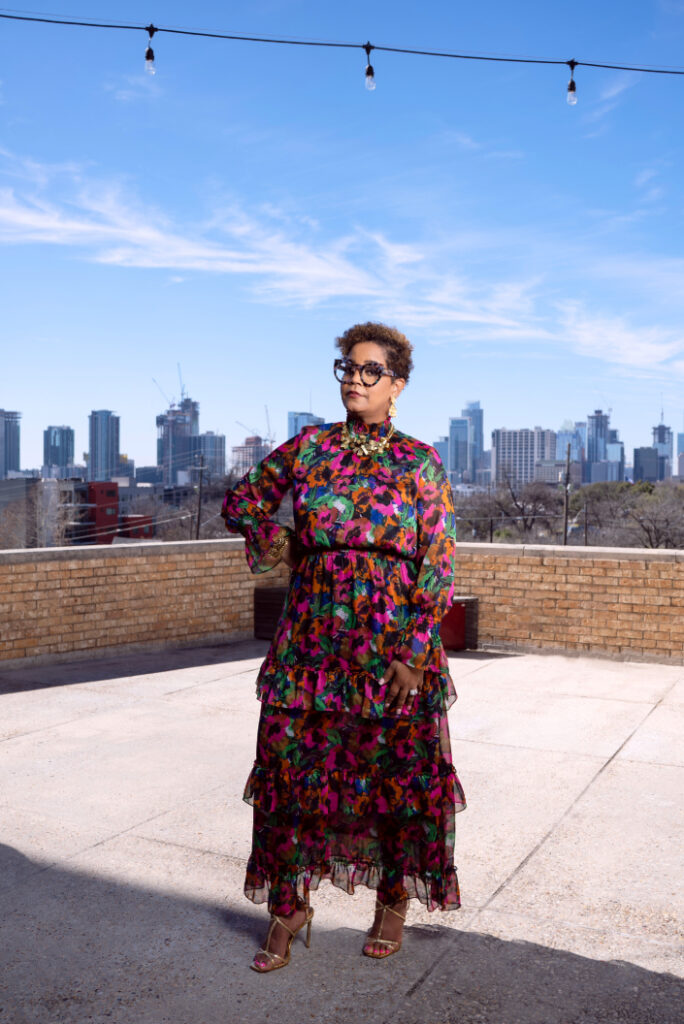
Multicolor dress, gold heels, jewelry: Estilo Boutique
“When I was working after I left teaching, I went to work in a corporation,” Owens says. “The president of the organization was a Black man, Milton. Very quickly, I was placed in rooms that I probably shouldn’t have been in, in my 20s. Milton one day says, ‘I know you want to be in leadership and be a VP. Not gonna happen. That path takes a while. I want you to be more worried about influence than I want you to be about title. I got an idea about an internal leadership program. What do you think?’
“I went home that night and drafted an entire curriculum, came back the next day. [That] was supposed to be the end of my time there; I was interning. That program was born, and a couple years ago, they brought me back to give me an award as the first person that wrote the program. I quit that day,” she says.
The knowledge, though sudden, isn’t necessarily surprising coming from the woman who in the fourth grade was diagnosed with a brain tumor and still thought of others first. “The tumor grew internally at first, so wasn’t noticeable,” she remembers. “One day, it protruded outwardly and my mom recognized it while washing my hair one Saturday (that was wash day). I shared a room with [another girl], whose brother gave me a doll that pees on herself. And I was so excited about it. I gave the doll to the girl I shared a room with.” Owens’ desire to provide comfort and kindness to others was as impactful then as it is today.
“I’d been married to my husband maybe 11 days, and we had just gotten back from our honeymoon,” Owens recalls. “I go home to the East Side, I walk in and I’m like, ‘Hey, you remember that dual-income family thing that we were so excited about? We’re not gonna have that. I’m starting my own consulting firm.’ I will never forget it. Arlyn looks up and says, ‘Awesome, I was waiting on you.’ Did I have a plan together? No. I had $300 in my checking account when I started. No plan, just started getting in front of organizations at luncheons. That’s how I got my chops in organizational culture, which is kind of the backbone of Edge of Your Seat—which, by the way, my dad came up with.”
The enthusiasm when she talks about the very direct inspiration her father provides brings warmth to the chilly Hilton hotel lobby where this conversation takes place. “He had seen me do some presenting in that environment, and was like, ‘I was on the edge of my seat when you did that thing for the student lending group.’”
Don’t live in the house that fear built.
Owens’ work is necessary at a time where education has become dangerously devalued. Particularly, preserving the complete history of our nation continues to be heavy work.
Moving into 2024, major conglomerates, who in 2020, made pledges to increase efforts in diversity, equity and inclusion, have backtracked on those promises. This sudden retreat from intentional diversity efforts can mostly be traced to an increasingly turbulent political environment, which culminated in state legislators introducing more than 65 anti-DEI bills since 2023.
Affirmative action, whose first legislative use dates back to 1961, when President John F. Kennedy instructed federal contractors to take “affirmative action to ensure that applicants are treated equally without regard to race, color, religion, sex, or national origin,” is under attack with a fervor that, many say, hasn’t been seen since Ronald Regan. The most recent study by job-hunting site Indeed shows that DEI-related job postings in 2023 declined 44%. In November 2023, “DEI job postings dropped 23% year over year.”
It seems targeted and quite violent.
“War-time level,” Owens says. “The strategies that throw something up in its place so quickly, the bright and shiny ball, people are sedated by it. But when I had to leave East Austin because I could no longer afford it, I was irritated at how much time we spent trying to stay at any cost. When I talked to the elders about not selling their homes to the developer, I had to reckon with my own hypocrisy. I left. Like, I left because it was just ridiculous. I look back on that and wonder, would I have made a different decision in my 40s and 50s than I did when I left in my late 20s and early 30s?”
The fire in her voice belies the very real sadness in her eyes. It’s an aspect of activism that few people pay attention to. Those dedicated to the call of activism are human beings fighting a seemingly never-ending war for equity. It is exhausting, grueling work, work that leaves little room for grief.
“It’s guttural,” she says. “It’s almost an out-of-body experience. My ears and my back get tight. It comes from a different place. It’s kind of like when you were growing up sitting in church, and you could tell by the way the gospel singers sang the song who had been through something. Like Mary J. Blige, for example. She’s been through something. It’s under the rib cage [kind of]pain, grief. I’ve really experienced that the last several years, and I’ve had to mourn what once was in order to even take the blinders off to do the current work. You can get so mired down in what once was and the past that you start admiring the problem, in a way. And you can’t move it. We’re so embedded in it. Without forgetting what that was, I’ve had to go through a grieving process.”
You can’t always play nice.
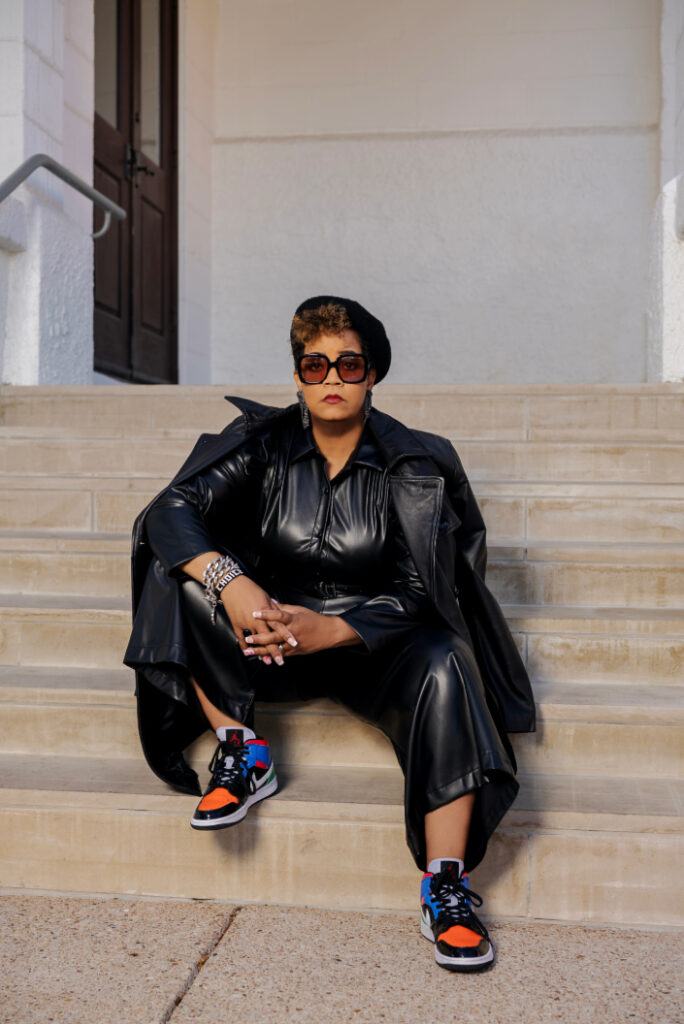
“In the last couple of years, it’s become a righteous anger around the erasure of my people and it being so bold and blatant,” Owens reveals. “I remember early on, not being able to sleep at night because I couldn’t shut my brain off from all the things that needed to happen to plug the drain of all the Black people leaving Austin. My body was tired, but my mind wouldn’t shut up. I think I discovered that activism is our responsibility and actively giving voice to it is our accountability.”
Activism in its boldest forms is about risk. It’s a lifelong adrenaline rush that keeps the pulse spiked, instincts on high alert. Much of the time, it’s women’s work, more often than not Black and Brown women’s work. A challenge that’s something like childbirth: the trauma the body and spirit go through to conceive of the notion of equity and peace. The back bends, the knees get weary, the voice often trembles (after too many hours of screaming, sometimes crying). But when it’s ideal, activism births a tender kernel of optimism for us to nurture and give room to grow.
“I wish that we would demystify the word activist so that people weren’t afraid of it or that it wasn’t associated with something negative and divisive. Activism is just the pathway to liberation and equity and inclusion for everybody, and we should have space for all the ways in which that might show up. We’re trying to figure out how to make a shift, and the answer might be in one of us. I’ve spent a lot of time [thinking], ‘What do I need to surrender?’ Every time I do, it ushers in something more beautiful than I ever imagined, more astute, more comprehensive, more specific, more aligned with what the community needs.”
That small speck of hope is a raindrop that once given light explodes into a rainbow. And most days, that is enough.
READ MORE FROM THE APRIL ISSUE

